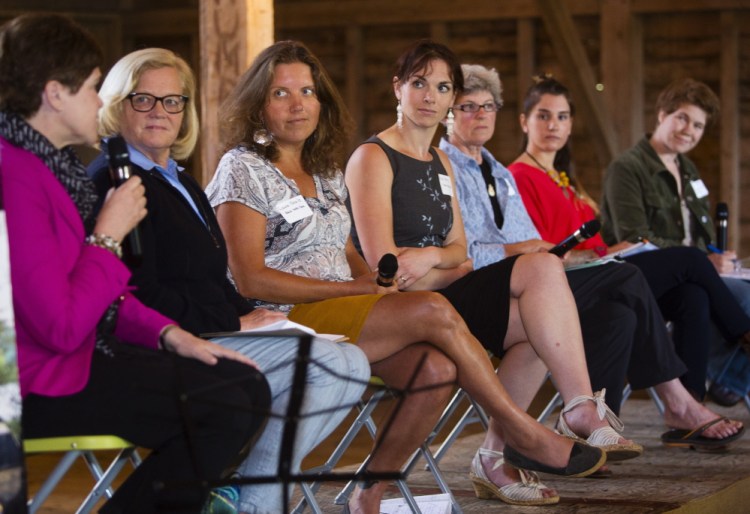The number two person in charge at the U.S. Department of Agriculture was in Maine on Monday to hear from local farmers – especially female farmers – about their challenges and to get a better understanding of Maine’s agricultural landscape.
A guest of U.S. Rep. Chellie Pingree, USDA Deputy Secretary Krysta Harden visited Wolfe’s Neck Farm in Freeport for a panel discussion with a group of women who own and operate farms or agricultural businesses in Maine. Many of the challenges the panelists brought up are ones shared by farmers across the country: access to capital, distribution networks, marketing.
Alice Percy of Treble Ridge Farm in Whitefield discussed the challenge of accessing capital to make improvements at the hog farm she operates with her husband, and how the USDA’s Environmental Quality Incentives Program has been helpful in allowing the farm fund its infrastructure improvements.
“Our farm wouldn’t be where it is today without that program,” she said.
Another farmer, Laura Neale, owner of Black Kettle Farm in Lyman, said marketing is her main challenge. While the good news is that the local food movement continues to gain momentum, that also creates more competition.
“Actually getting paid for this amazing food you’re producing is becoming a challenge,” she said.
She’s run her farm for seven years, and each year her number of community supported agriculture membership has grown, until this year.
“This is the first year that my CSA numbers have declined, and I think it is because there are so many choices now,” she said. “That’s so wonderful, but it’s also challenging as a business owner.”
Harden said after the talk that hearing from the panelists was very helpful in her better understanding Maine’s diverse agricultural landscape.
“There was a lot of energy in the room,” Harden said. “The panelists had great stories about their own struggles, their own challenges. Their enthusiasm and commitment to agriculture was very evident.”
Other panelists were Gina Simmons, operator of Common Wealth Poultry Co. in Gardiner; Jean Koons of Kennebec Cheesery; and Marada Cook of Crown of Maine in Vassalboro.
While the panel discussion was billed as being about women in agriculture, the conversation didn’t speak directly to that topic but rather the general challenges faced by everyone in the agriculture industry.
That was just fine to Simmons, who operates the only USDA-inspected poultry processing plant in the state. She acknowledges struggling to think of what she would say if asked about specific challenges she faced as a woman in the agriculture industry.
“That’s because our generation of women is lucky enough where a lot of those distinctions no longer exist, where we have the opportunity to enter fields like this without discrimination,” she said. “I also think that when you ask the question specifically related to women that’s almost like a moving back. … To really move forward you have to think of yourself not just as a woman, but as all these other things, like an entrepreneur, a manager, a physical laborer.”
Harden said she’s had this type of women-in-agriculture panel discussion in many states, and each state is different.
MAINE IS ‘VERY LUCKY’
Maine is “very lucky” because women already make up 30 percent of all farmers, Harden said.
“Some of the struggles and challenges of women here are not about having counterparts or not about having a network or not about having good role models,” she said. “Here it seems like they’re ahead of the game, the women already have seized the ability to get involved in agriculture and are very committed to a thriving industry with a lot of opportunities. So we didn’t need to talk about it much here, which is kind of nice, frankly.”
“I think a part of what the deputy secretary wanted to do was give more women a chance to be part of the conversation and dialog,” Pingree said after the event. “You often hold a meeting for farmers and you see the men who are engaged in it. We just really wanted to highlight some of the amazing professional, hard-working women working in these fields and hear what they had to say.”
Women in agriculture interests Harden, having herself grown up on a peanut farm in Georgia.
In February, she launched the Women in Agriculture Mentoring Network as a way to connect women involved in agriculture around the country.
Nationally, the percentage of farmers who are women was also about 30 percent in 2012, according to USDA data. But the share of U.S. farms operated by women was only 14 percent that year.
Women in agriculture aside, Harden said these opportunities to visit farmers on their own terms is very important for the work she does when she returns to Washington, D.C. Her visit to Maine started with a tour of Jordan Farm in Cape Elizabeth Monday morning and lunch at Vinland, the Portland restaurant that serves dishes that contain only locally sourced ingredients.
“There’s no substitute for getting on the ground. You lose something in the translation if you’re not hearing it from them. You sit down and spend a little time with them, they’ll be franker, more specific about things,” Harden said. “We have smaller and smaller budgets, so making wise decisions, informed decisions right now is more important than ever.”
Send questions/comments to the editors.



Comments are no longer available on this story